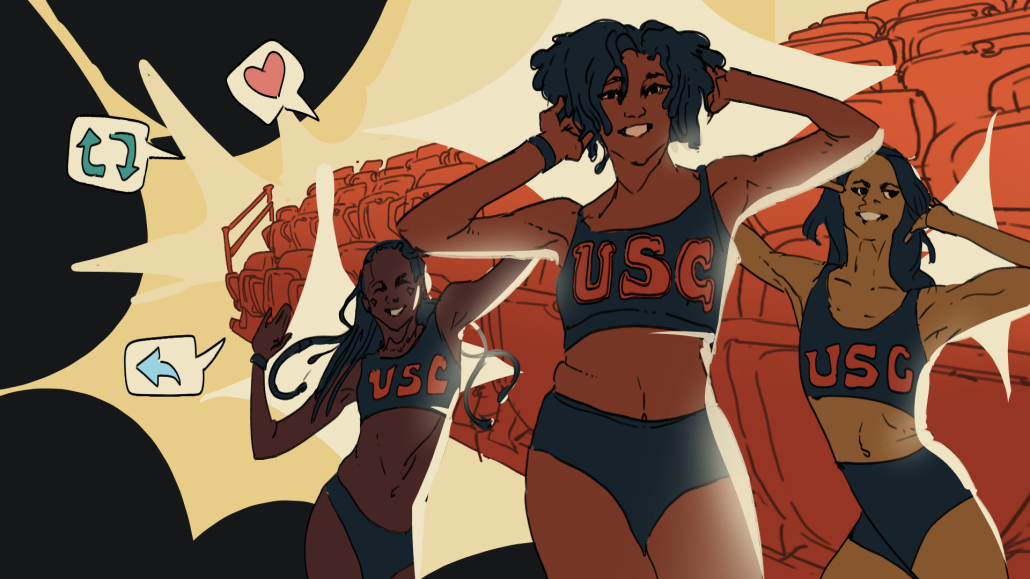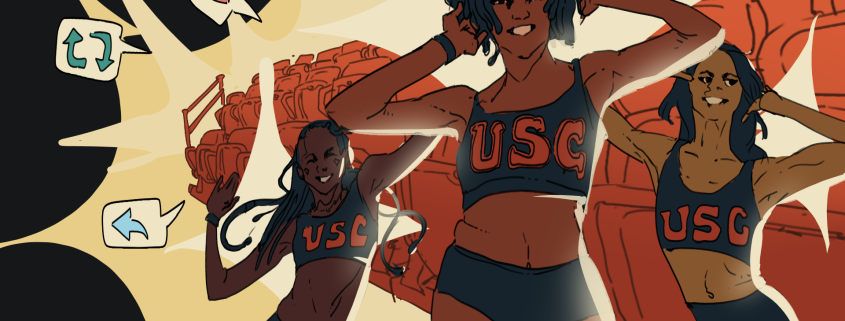Elande Ain’t Neva Lied: USC’s Cardinal Divas made Black history! Why we mad?

Black Girl Magic.
That’s what I witnessed when the Cardinal Divas graced the Colosseum stands with their debut performance. More than magic, it was Black Girl Power. To watch history, Black history, be made at a place like USC in such an uplifting way made me prouder than ever. As a Black person, I was simply overjoyed.
There aren’t a plethora of spaces on campus for us. We make up barely 6% of the student body as of the Fall 2021 semester, but that comes as no surprise at a predominantly white institution. However, a majorette team here? That’s revolutionary.
Here is my argument and I will always stand by it: Anything positively amplifying Blackness is worth celebrating. We as Black people should take it as a win anytime we come together and celebrate a Black experience, especially in a white space.
That perspective made the split in opinion among the Black community regarding the Divas disappointing. The sole premise of the debate was based on comparisons between Historically Black Colleges’ and Universities’ culture — the whole PWI v HBCU dispute. Many argued that the Cardinal Divas were stealing from HBCU culture, that there are multiple HBCUs that have long been doing this and never got the attention USC has and that if these women wanted to join a majorette team they could have attended an HBCU.
To address the first allegation, I don’t believe the Cardinal Divas stole anything. Stealing implies that HBCUs lost something from USC making a team. They didn’t. They are also not the first majorette team to start at a PWI: UC Berkeley’s Bearettes blazed that trail in 2019. I can understand a cultural appropriation argument, but not in this case of Black women embracing a form of HBCU culture outside of the HBCU space. These aren’t intruders. These women simply love to dance in this style, the same as other Black women like them. What’s wrong with that?
There is an overall argument of fear that the dance and history of majorette will be watered down if introduced to a white audience. Because Black dance and culture have no doubt been appropriated over the years, I can understand where the fear aspect plays in viewing this as a possible issue. There is the idea that if majorette dancing lost its footing in HBCUs, it would transform as it expands to different PWIs.
But fear is not fact. Fear should not be a reason as to why we don’t allow other Black women to express themselves in the way they know and love best. Many of the Cardinal Divas have been majorette dancing since they were little. And college is truly a bubble; Black students can continue to maintain authentic traditions of the dance much more easily here than in the grandiose realm of overall society. These are Black kids having fun during college, can we not make it deeper than that?
Being that almost all USC students support the Cardinal Divas (because duh, they go here), I asked my cousin Dejah Fleurancois, a junior at Howard University and active member on campus, her thoughts. Honestly, I just wanted to make sure I wasn’t tripping!
Many students can’t just attend an HBCU that easily because of the costs and notorious lack of scholarships these schools usually offer. So “it’s still important that Black students are able to get the Black experience wherever they are,” she states. That was the thing I thought everyone in the Black community would agree on.
The Jennifer Hudson Show hosting the Cardinal Divas intensified the existing criticism — a prominent point regarding recognition. The Cardinal Divas is among the first of its kind in terms of majorette dancing at a PWI, so naturally one has to understand why it would receive heightened attention over its usual iterations at HBCUs.
Still, credit wasn’t given where it was due. There are many HBCU students, like my cousin, who do fully support a majorette team at USC, but it was important to address the history and origins of the dance at HBCUs — especially since they were given a larger platform and exposure than incredible HBCU majorette teams that have existed for years before them. Dejah posits that credit should have been given because “There would be no existence at USC without HBCU influence.” She’s right.
My initial thoughts on the backlash were since when did tradition place a higher priority over our race? When did HBCU culture trump Black culture? That’s what got me. Black people attending a non-all-Black school suddenly are not welcome to engage in a Black form of expression? Seriously, it’s not us against us, it’s us against white institutions, let’s not forget that.
The valid criticism is just acknowledging where the Cardinal Divas came from: a remarkable history of Black women before the 1960s starting their own revolutions at their HBCUs. Now the Cardinal Divas began a revolution before our eyes. We as Black people shouldn’t be blind to that. Instead, we should be celebrating — anytime and anywhere Blackness is celebrated.
Elande Abate is a junior focused on creating a space for Black discourse from entertainment to serious issues in her column, “Elande Ain’t Neva Lied.”

